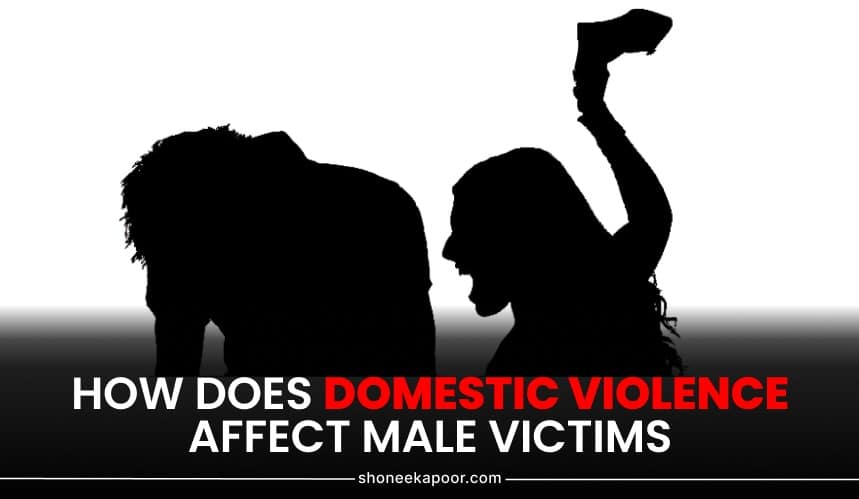Domestic violence is violence committed by someone in the victim’s domestic circle. This includes partners, ex-partners, immediate family members, relatives, and friends. The term ‘domestic violence’ is used when there is a close relationship between the offender and the victim. There is usually a power gap between them, and the victim is sometimes dependent on the offender. Domestic violence can take the form of physical, sexual or psychological abuse.
People in India and around the world usually associate domestic violence as women-centric and believe that it is only inflicted upon women. But they tend to forget that men of all ages are subjected to it, too. Domestic violence is an issue affecting people of all ages, races, genders, and sexual orientations. Violence against men and same-sex domestic violence is often considered less of a threat to society and the people involved. It is a severe issue that has long existed in society and has serious consequences, but it has been constantly ignored by society.
The common types of abuse that male victims experience are emotional, physical, and psychological. Men tend to stay in abusive relationships for the same reasons that women do because they blame themselves for the abuse, there are children involved, and they have some dependency as it relates to the abuser.
Reasons why men stay in abusive relationships are assuming blame and dependency on the abuser for survival and the children. Male victims of domestic violence often take the blame for the acts of violence because they feel as though they have done something wrong to cause their batterers to abuse them. Another reason is that male victims need to stay with their abusers because they are dependent on them for support. Children are also a reason men stay because they feel that if they leave, the children would have to suffer the same consequences they have had to, and they remain to protect the children.
Domestic violence affects male victims in the following ways:
Psychological/Mental effects
- Men who are subjected to domestic violence suffer a lot psychologically. They tend to underestimate themselves and blame themselves for all the wrong that has happened to them.
- Men suffering violence in their domestic relationships tend to suffer from anxiety and depression. They are not able to adjust themselves to the societal norm of being the ‘alpha’ in the domestic setup and thus develop various mental ailments.
- They tend to develop suicidal tendencies due to continuous harassment and violence.
- Men tend to develop Post Traumatic Stress Disorder. This can be a result of experiencing trauma or having a shocking or scary experience, such as sexual assault or physical abuse. One may be easily startled, tense or on edge, have difficulty sleeping, or have angry outbursts. One may also have trouble remembering things or negative thoughts about oneself or others.
- Loss of self dignity and respect is a common phenomenon which one may experience due to all the sufferings and inability to fit in a socially acceptable framework domestic relationship.
- Men cannot share and express their thoughts and feelings about the problems they are facing as they are always told to ‘man up’ or ‘not to cry like a girl’ and therefore have no one to empathize with them.
Physical sufferings
- Whenever the term ‘domestic violence’ comes into mind, one generally pictures females being thrashed and assaulted physically, but males, too, are equally likely to suffer such abuse.
- Usually, older people and children are two classes among males who suffer a lot of physical violence in domestic relationships.
- Men are also likely to experience sexual abuse in their domestic households, which men of all ages can experience.
- Some of the physical injuries that can occur include cuts, bruises, bite marks, concussions, broken bones, penetrative injuries such as knife wounds, joint damage, loss of hearing and vision, migraines, permanent disfigurement, etc.
Institutional discrimination
- Due to the general notion of men not being subjected to domestic abuse and violence, there are not many remedies available as they are actively available to women.
- Even most of the laws are discriminatory and tend to favour women at large. The Indian legislation for preventing and punishing domestic violence is women-centric, and males who are subjected to such harassment have to take the shield of the penal provisions, which, too, at times, are not as empowering as are available to women.
- Unlike females, men do not have government-backed institutions to deal with their miseries. There are not many institutions fighting for men’s rights.
Suffering Socially
- Males who have been domestically abused or are subjected to violence suffer social discrimination and are often looked down upon.
- Men are often socialized to think of themselves as victims and accept things as it is, which can, in turn, be very detrimental to their well-being.
- Society does not easily believe that men can too be subjected to domestic abuse and often joke about the serious issue.
- Abuse at home affects one’s ability to face society and also develops a fear of being stigmatized at the hands of the general public.
Financial suffering
- Domestic violence results in less productivity of an individual and, in turn, affects his employment and capacity to work.
- Abuser often tends to exploit the victim financially and drain his resources.
- Indulging in litigation or fighting for their rights can be an expensive deal for male victims because of the lack of institutions and organizations in support of them.
You may contact me for your specific case by visiting Contact Us



Leave A Comment